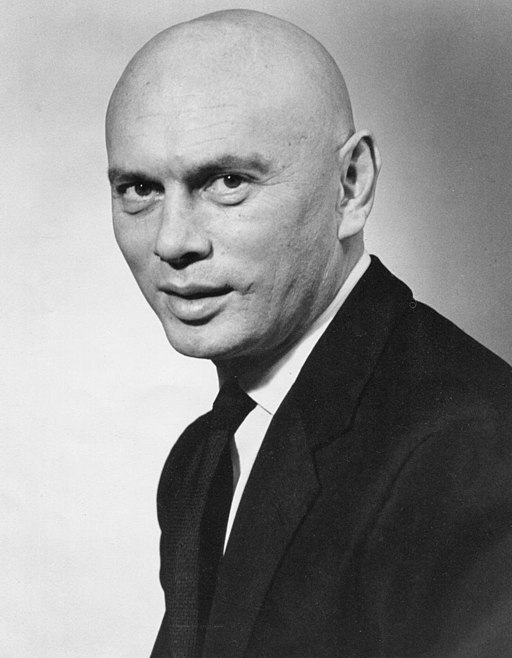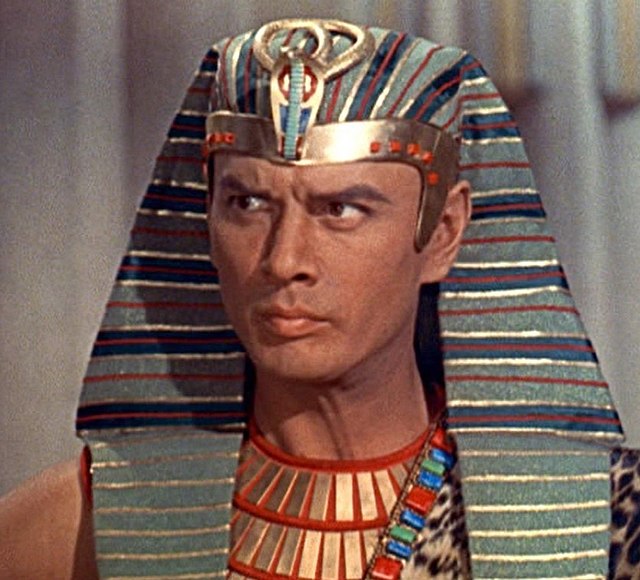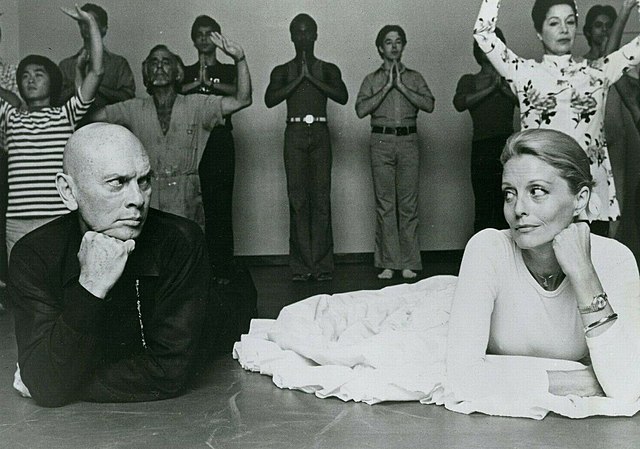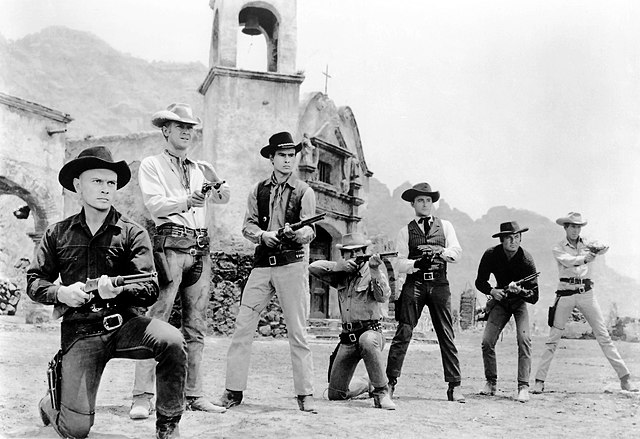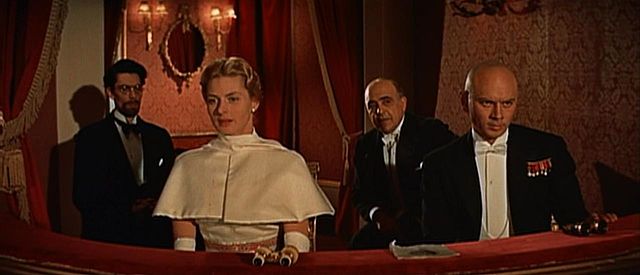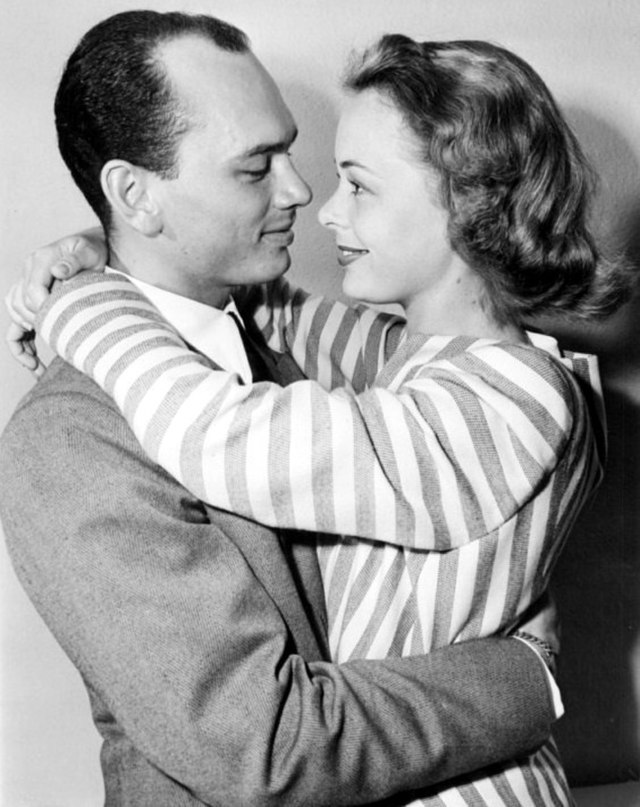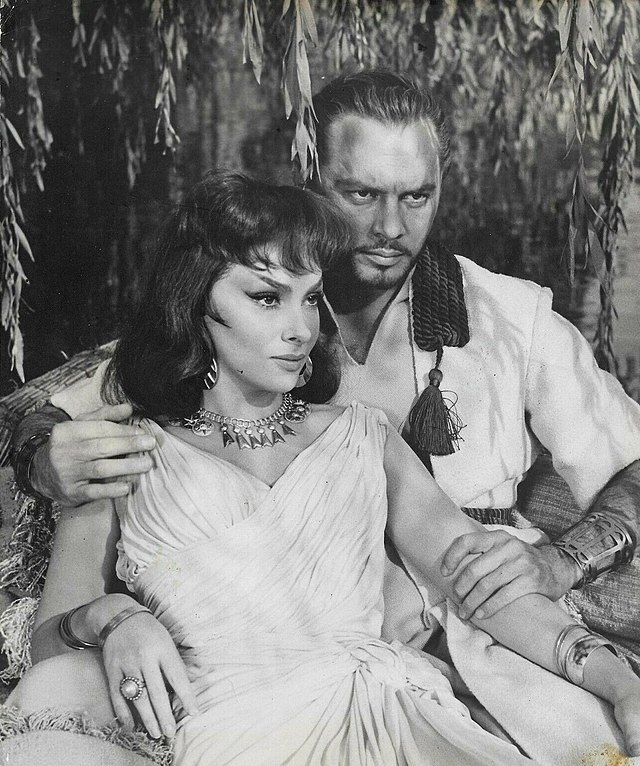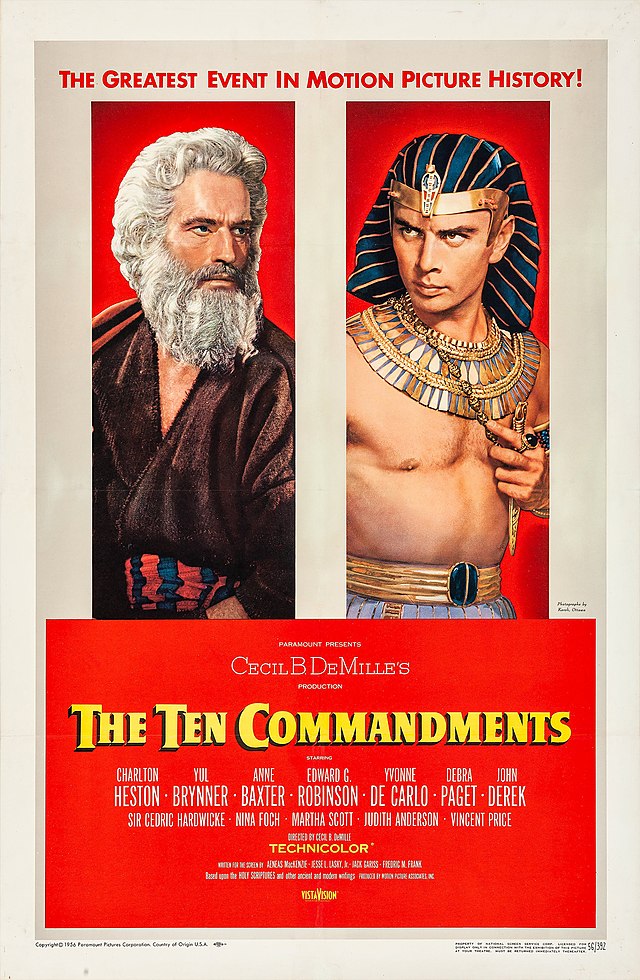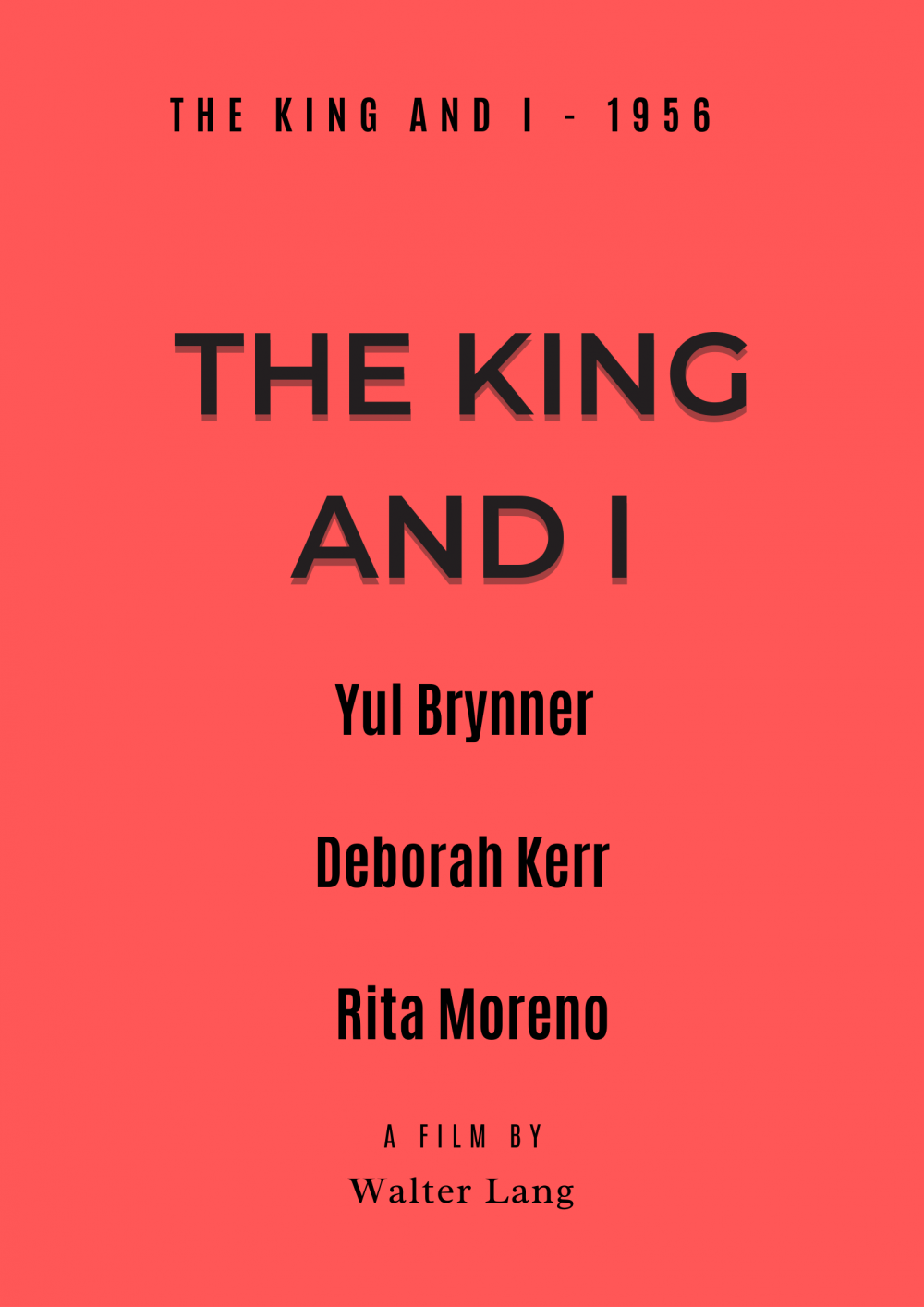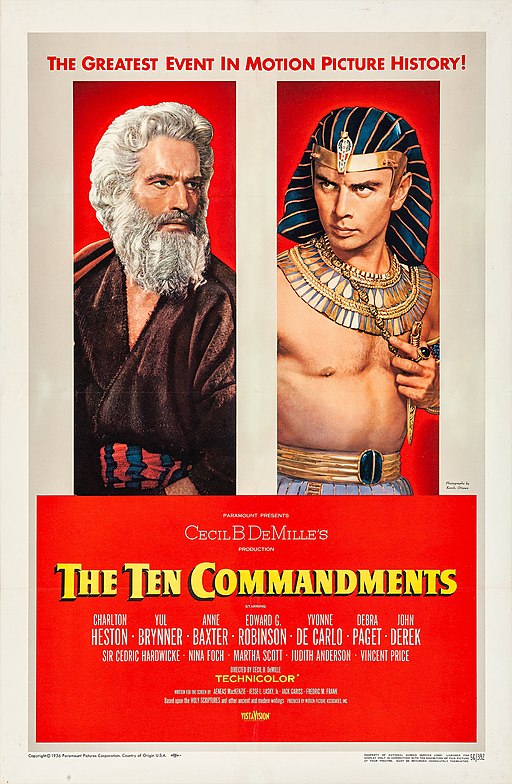Yul Brynner
back| Full Name | Yuliy Borisovich Briner |
| Stage Name | Yul Brynner |
| Born | July 11, 1920 |
| Birthplace | Vladivostok, Far Eastern Republic (now Russia) |
| Died | October 10, 1985 |
| Buried | Saint Robert Churchyard, La Tourraine, France |
| Married to | Virginia Gilmore (1944–1960), Doris Kleiner (1960–1967), Jacqueline Thion de La Chaume (1971–1981), Kathy Lee (1983–1985 |
| Children | Yul 'Rock' Brynner, Victoria Brynner, Lark Brynner, and Mia Brynner |
| Notable films | The King and I - The Ten Commandments - The Magnificent Seven |
Yul Brynner – The enigmatic “Yul” of the big screen
Yul Brynner (1920–1985) was a magnetic actor best known for his iconic role as King Mongkut of Siam in the musical "The King and I", a performance for which he won an Academy Award for Best Actor. Born in Vladivostok, Russia, Brynner's distinctive shaved head and deep voice made him instantly recognizable.
After establishing himself on Broadway with "The King and I", he transitioned to film, delivering powerful performances in classics like "The Ten Commandments", "Anastasia", and "The Magnificent Seven". His commitment to the role of King Mongkut was unparalleled; he portrayed the character over 4,500 times on stage. Beyond acting, Brynner was a passionate photographer and authored several books.
He was also known for his dedication to anti-smoking campaigns after being diagnosed with lung cancer, making impactful public service announcements about the dangers of smoking. Brynner passed away in 1985, but his legacy as one of Hollywood's most unique and dynamic stars endures.
Related
Biography, movies and analysis of Yul Brynner
Early Life
Yul Brynner was born as Yuliy Borisovich Briner in 1920 in Russian most eastern port town Vladivostok. He grew up amidst the turbulent period in post-revolutionary Russia. At that time Vladivostok was part of the so-called Far Eastern Republic, an independent state that existed from 1920 until 1922t was overthrown by the Soviet Red Army making it part of the Soviet-Union.
His father, Boris Yuliyevich Briner, was a wealthy mining engineer while his mother, Marousia Dimitrievna, worked as an actress and singer. They lived a good life at the time when Yul was born, but that came to a tragic end when the Soviets confiscated all their belongings.
His multicultural background, with Swiss-German and Russian Buryat ancestry, would later help sculpt his exotic, enigmatic screen persona.
When Brynner was 4 years old young, his father and mother separated. His father fell for Russian actress Katerina Kornakova. She was a well-known actress and worked together with Michael Chekhov at the Moscow Art Theatre. Although Yul’s father kept supporting his family financially, his mother Marousia Blagovidova decided to move to the Chinese city of Harbin in 1927 where Yul attended school. After school young Yul learned to play guitar and took singing lessons. That was his first contact with the performing arts.
In 1933 mother and sister Vera, together with 13 year old Yul moved to Paris, fearing a war between China and Japan. As his mother was from Roma background, Yul began a performing career in Paris, singing in Russian and Roma and playing his guitar. He performed in the Hermitage and several Parisian night clubs. In 1936 Yul moved to the French harbor town of Le Havre where he joined a trapeze troupe, working in circuses. A back injury caused by a fall while making an acrobatic jump made Yul taking narcotics to kill the unsustainable pains. In 1937 Yul took opium on a regular basis making him a 17-year old drug addict. To cure him off his drug addiction his family sent him to Lausanne, Switzerland where his aunt Vera Dmitrievna Blagovidova worked as a physician.
In 1938 the family moved again, back to China once more. Mother Marousia was diagnosed with leukemia and she sought the help of her ex-husband to sustain them financially, which he did. The new wife of his father, actress Katerina Kornakova, gave Yul his first acting lessons. His mentor became Michael Chekhov who practiced the acting theories taught to him by Konstantin Stanislavski, he leading theatre director of his generation.
As his mother needed more treatment for her leukemia the family decided that it was time to move again, this time to the United States where the best possible treatment for the disease was available. That decision was the ultimate step to Yul Brynner’s acting career.
Start in the Entertainment Industry
The Brynner family moved to the United States in 1940, where Yul's career in entertainment began to take shape. He worked as a model and a radio announcer, and during World War II, he found work as a French-speaking radio announcer and commentator for the US Office of War Information. In those years his mentor Michael Chekhov also moved to the United States. Yul helped Chekhov out as a truck driver for his theatre company which he had set up in the States. In the meantime Chekhov kept training Yul for an acting career.
Yul Brynner and Marlene Dietrich
In 1941 Yul met Marlene Dietrich in the Blue Angel Club in New York where Yul had a singing act. Although Dietrich was 19 years older they became a couple. The relationship went on and off but lasted a couple of years.
Brynner's first major acting role came in 1949 when he played the titular character in "Lute Song" opposite Mary Martin on Broadway. It was the beginning of his notable career in acting, which later transformed him into a Hollywood icon.
Breakthrough and Stardom
Yul Brynner's groundbreaking role came when he portrayed King Mongkut of Siam in the Rodgers and Hammerstein musical "The King and I" on Broadway in 1951. His compelling and charismatic performance was an instant hit, catapulting him to stardom. His shaved head, which became his trademark look, and his commanding voice created a magnetic screen presence.
In 1956, Brynner reprised his role as King Mongkut in the film adaptation of "The King and I," which garnered him an Academy Award for Best Actor. His performance in the film cemented his position as a top star in Hollywood.
Eclectic Film Career
Brynner’s movie career took off with an eclectic mix of roles that showcased his diverse talent. From portraying Pharaoh Rameses II in "The Ten Commandments" (1956) to Chris Adams in "The Magnificent Seven" (1960), his performances always carried a distinct blend of strength and vulnerability.
He continued to delve into various genres, from drama to westerns to romantic films, always bringing a unique and powerful presence to the screen. "Anastasia" (1956), "Solomon and Sheba" (1959), and "Westworld" (1973) are amongst his notable films, proving his flexibility and robust persona that could traverse different characters and epochs.
Analysis of his acting style
Yul Brynner's acting style was characterized by a unique blend of intensity, charisma, and an exotic allure that made him stand out in both film and theatre. Here's an analysis of his acting and the aspects in which he stood out:
- Physical Presence: Brynner's distinctive shaved head (a look he adopted for "The King and I" and maintained for the rest of his career) combined with his commanding height and physique gave him a striking on-screen and onstage presence. This physicality was instrumental in roles that required a dominant or authoritative figure.
- Versatility: While he is best remembered for his role as King Mongkut in "The King and I", Brynner showcased his range in a variety of films. From the stoic Chris Adams in "The Magnificent Seven" to the android gunslinger in "Westworld", Brynner demonstrated an ability to adapt to various genres and characters.
- Charisma: There's no denying Brynner's magnetic charm. His roles often carried a regal, magnetic quality—whether he was playing a pharaoh, a king, or a gunslinger.
- Voice: Brynner's deep voice, combined with his unique accent (a blend from his diverse heritage and international upbringing), added another layer to his characters. His voice was both soothing and commanding, adding depth to his roles.
- Commitment: Brynner's dedication to his roles was evident. For "The King and I", he not only shaved his head but also delved deep into the character, reprising the role numerous times on stage over decades and becoming synonymous with King Mongkut.
- Physical Acting: Beyond just delivering lines, Brynner was known for his physical acting. His background in circus performance and his training as a trapeze artist contributed to his understanding of body movement, posture, and physical expression. In "The King and I", his dance with Deborah Kerr in "Shall We Dance" is a prime example of this.
- Exotic Allure: Brynner's mixed heritage (born in Russia to a Mongolian-Romani mother and a Swiss-German father) gave him an ambiguous ethnicity in the eyes of the audience. This allowed him to play a diverse array of characters from different backgrounds, from an Egyptian pharaoh in "The Ten Commandments" to a Russian cowboy in "The Magnificent Seven".
Quotes from Yul Brynner:
- On Acting: "To be a good actor you have to be something like a criminal, to be willing to break the rules to strive for something new."
- On His Signature Look: "I am not an actor. I am a performer. No actor in the world has his face covered with makeup like mine. None has his hair sprayed and waved like mine. None walks like me. None talks like me."
- On His Approach to Life: "I don’t give anything away for nothing. I always get something back. I get it in cash, checks, or goodwill. But I always get paid."
- On His Legacy: "I have been offered a lot for my work, but never everything."
- On His Iconic Role in The King and I: "I have learned something from the play. I have even changed in the play. I know now that one cannot step out of one's scheme of things, even in imagination."
- On Learning from Experience: "You can't leave something and go back to it and find it at all the same way. You have to be lucky and wise to live a lot with people. Knowing it can never be the same again."
Personal Life
Yul Brynner was not only an actor but also a director, known for "The Journey" (1972), and a talented photographer. His photographic work, which includes a series of intimate portraits of Hollywood stars, provides a fascinating glimpse into the off-screen lives of celebrities.
In his personal life, Brynner faced ups and downs with four marriages and four children. His struggles with smoking and its consequent impact on his health became pivotal in his later years. Diagnosed with lung cancer in the early 1980s, Brynner became an anti-smoking advocate, creating a public service announcement that discussed the dangers of smoking and was aired posthumously.
Yul Brynner and spouses
Yul Brynner was married four times during his life. Here is some detailed information about each of his spouses:
1. Virginia Gilmore (1944-1960)
- Profession: Actress
- Background: Virginia Gilmore was an American film, stage, and television actress. She enjoyed a successful career in the 1930s and 1940s, making her debut in Hollywood with the film "Western Union" (1941). Her marriage with Brynner lasted for 16 years, and they had one child together.
- Child: Rock Brynner (b. 1946), who became an author and historian.
2. Doris Kleiner (1960-1967)
- Profession: Model
- Background: Doris Kleiner was a Chilean model and socialite. She and Brynner got married in 1960, and their wedding took place on the set of "The Magnificent Seven" in Mexico. Despite the glamour and publicity that surrounded their relationship, their marriage lasted for only seven years.
- Child: Victoria Brynner (b. 1962), who would grow to work in the entertainment and fashion industry.
3. Jacqueline de Croisset (1971-1981)
- Profession: French socialite and actress
- Background: Jacqueline Thion de la Chaume was a French socialite and the former wife of French film director Francis de Croisset. She and Brynner were married for a decade, during which they were active in the international social circuit.
- Child: They adopted two Vietnamese children: Mia (b. 1974) and Melody (b. 1975).
4. Kathy Lee (1983-1985, Brynner's death)
- Profession: Assistant
- Background: Kathy Lee worked as Yul Brynner's assistant before their relationship turned romantic. They were married in a private ceremony and remained together until Brynner's death in 1985.
- Child: No children from this marriage.
Death and his battle with cancer
In the early 1980s, Yul Brynner began experiencing health issues, which were later attributed to lung cancer, a diagnosis that came after years of heavy smoking — a habit widespread and socially accepted among actors and the general public at that time. Even as his health deteriorated, Brynner remained professionally active, continuing to perform on stage and screen with remarkable vitality.
The Public Announcement and Anti-Smoking Advocacy
In a bold and transformative move, Brynner chose to transform his personal struggle into a public campaign against smoking. In January 1985, during an appearance on "Good Morning America," Brynner spoke openly about his diagnosis and impending death, delivering a potent anti-smoking message. Posthumously, a public service announcement was released, featuring Brynner's stern warning: “Now that I'm gone, I tell you, don't smoke.”
Death and the Echo of His Message
Yul Brynner succumbed to lung cancer on October 10, 1985, in New York City. His demise was not just a loss to the cinematic world but also signaled the end of an era in Hollywood. Buried in the Saint Robert Churchyard in La Tourraine, France, Brynner left behind not just a rich legacy of cinematic and theatrical performances, but also an enduring message about the perils of smoking, which reverberates even today.
Awards and nominations for Yul Brynner
Yul Brynner's iconic performances in film and on stage earned him several awards and nominations throughout his career. Here's a breakdown of the significant accolades he received:
Awards Won:
Academy Awards (Oscars)
- 1957: Best Actor in a Leading Role for "The King and I"
Tony Awards
- 1952: Best Performance by a Leading Actor in a Musical for "The King and I"
- 1985: Special Tony Award for his lifetime achievement in theater.
Golden Globe Awards
- 1957: Best Actor – Motion Picture Musical or Comedy for "The King and I"
- 1958: Henrietta Award – World Film Favorite, Male
Hollywood Walk of Fame
- 1960: Star on the Hollywood Walk of Fame for Motion Pictures at 6162 Hollywood Blvd.
Nominations:
Golden Globe Awards
- 1961: Best Actor – Motion Picture Drama for "The Magnificent Seven"
- 1974: Best Actor – Motion Picture Musical or Comedy for "Westworld"
Laurel Awards
- 1958: Top Male Musical Performance for "The King and I" (Ranked 3rd)
- 1961: Top Male Action Performance for "The Magnificent Seven" (Ranked 4th)
BAFTA Awards
- 1957: Best Foreign Actor for "The King and I"
Legacy
Yul Brynner’s biography unfolds like an epic tale, mirroring the various roles he portrayed on screen. The King, the Warrior, the Lover, and the Outlaw — Brynner played them all with an authenticity and intensity that could only be derived from a life fully lived. From the stages of Paris to the silver screens of Hollywood, his journey encapsulates a classic tale of triumph, tragedy, and timeless talent.
Movies featuring Yul Brynner
1940s
- 1949:
- "Port of New York"
1950s
- 1956:
- "The King and I"
- "The Ten Commandments"
- "Anastasia"
- 1957:
- "The Brothers Karamazov"
- 1958:
- "The Buccaneer"
- "The Sound and the Fury"
- "The Journey"
- 1959:
- "Solomon and Sheba"
- "The Sound and the Fury"
1960s
- 1960:
- "Once More, with Feeling!"
- "The Magnificent Seven"
- 1961:
- "Goodbye Again"
- "Testament of Orpheus" (uncredited)
- 1962:
- "Escape from Zahrain"
- "Taras Bulba"
- 1963:
- "Kings of the Sun"
- 1964:
- "Invitation to a Gunfighter"
- "Flight from Ashiya"
- 1965:
- "Morituri"
- 1966:
- "Return of the Magnificent Seven"
- "Cast a Giant Shadow"
- 1967:
- "Triple Cross"
- "The Double Man"
- 1968:
- "Villa Rides"
- "The Long Duel"
- 1969:
- "The Battle of Neretva"
- "The File of the Golden Goose"
- "The Madwoman of Chaillot"
1970s
- 1970:
- "Adiós, Sabata"
- 1971:
- "Romance of a Horsethief"
- "Catlow"
- "The Light at the Edge of the World"
- "Adiós, Sabata"
- 1973:
- "Westworld"
- 1975:
- "Death Rage"
- 1976:
- "Futureworld"
1980s
- 1980:
- "The Magic Christian" (uncredited)
- 1985:
- "Death Rage" (re-release)
Series featuring Yul Brynner
1950s
- 1956: "Omnibus" (1 episode: "The King and I")
1960s
- 1960: "General Electric Theater" (1 episode: "The Man Who Wanted Everything Perfect")
- 1965: "The Virginian" (1 episode: "Cat and Mouse")
- 1966: "The DuPont Show of the Month" (1 episode: "Arrowsmith")
1970s
- 1977: "The Shape of Things" (1 episode: "Anna and the King of Siam")
1980s
- 1985: "The Colbys" (Unknown episodes - unverified)
Others
- "The Ed Sullivan Show": Yul Brynner also appeared in this variety show several times, mostly in the 1950s and 1960s, although it is not a scripted series.
Brief overview of Selected Films:
1. "The King and I" (1956)
- Overview: A film adaptation of Rodgers and Hammerstein's musical, it tells the story of Anna Leonowens, a British schoolteacher who comes to Siam to educate the children of King Mongkut. A clash of wills and cultures ensues, but mutual respect and understanding ultimately prevail.
- Main Cast:
- Yul Brynner as King Mongkut of Siam
- Deborah Kerr as Anna Leonowens
2. "The Ten Commandments" (1956)
- Overview: An epic film that depicts the biblical story of the life of Moses, leading the Israelites out of Egypt and receiving the Ten Commandments from God on Mount Sinai.
- Main Cast:
- Charlton Heston as Moses
- Yul Brynner as Rameses
- Anne Baxter as Nefretiri
3. "Westworld" (1973)
- Overview: In a futuristic amusement park, guests interact with androids in recreations of different historical periods. Things take a dark turn when the robots malfunction and begin harming the visitors.
- Main Cast:
- Yul Brynner as The Gunslinger
- Richard Benjamin as Peter Martin
- James Brolin as John Blane
4. "The Magnificent Seven" (1960)
- Overview: A western adaptation of Akira Kurosawa's "Seven Samurai," the film follows a group of seven gunfighters hired to protect a small Mexican village from a group of marauding bandits.
- Main Cast:
- Yul Brynner as Chris Adams
- Steve McQueen as Vin Tanner
- Charles Bronson as Bernardo O'Reilly
5. "Anastasia" (1956)
- Overview: The film explores the mystery of Anastasia Romanov, a woman who appears in Paris in the 1920s, claiming to be the long-lost daughter of the executed Tsar Nicholas II of Russia.
- Main Cast:
- Ingrid Bergman as Anna Koreff/Anastasia
- Yul Brynner as General Sergei Pavlovich Bounine
- Helen Hayes as the Dowager Empress Maria Feodorovna
6. "The Brothers Karamazov" (1958)
- Overview: Based on Fyodor Dostoevsky's novel, the film explores the complex dynamics of the Karamazov family, driven by the erratic behavior and moral decay of its patriarch.
- Main Cast:
- Yul Brynner as Dmitri Karamazov
- Maria Schell as Grushenka
- Lee J. Cobb as Fyodor Karamazov
7. "The Sound and the Fury" (1959)
- Overview: The film, inspired by William Faulkner's novel, depicts the decline of the Compson family in the American South, highlighting themes of decay, loss, and despair.
- Main Cast:
- Yul Brynner as Jason Compson III
- Joanne Woodward as Quentin Compson
- Margaret Leighton as Caddy Compson

